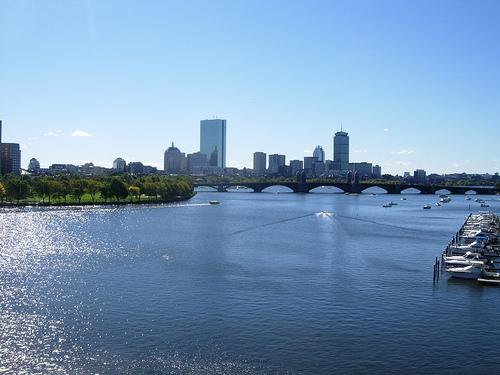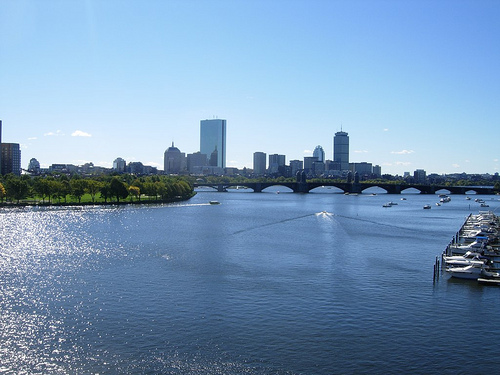 American cities like Boston could be the basis of a brighter future.Photo: Sarah Goodyear
American cities like Boston could be the basis of a brighter future.Photo: Sarah Goodyear
“There is no national economy in the United States, or in China, or in Germany. National economies are just networks of metropolitan economies.”
So says Bruce Katz, director of the Metropolitan Policy Program at the Brookings Institution, in a video commentary that goes along with a report he’s authored about the importance of metro areas to the economic future of the United States.
Katz thinks that if our country stops fetishizing real estate and consumption, and gets back to incubating and executing innovation — something that happens best in metro areas — the future could look a lot brighter.
But he says that our nation’s obsession with preserving a sepia-toned vision of small-town America (as famously enshrined in Sarah Palin’s speech to the 2008 Republican National Convention) could prove to be a devastating impediment:
We mythologize the benefits of small-town America, but it’s the major metros that make the country thrive. Why? When cities collect networks of entrepreneurial firms, smart people, universities and other supporting institutions in close proximity, incredible things happen. People engage. Specializations converge. Ideas collide and flourish. New inventions and processes emerge in research labs and on factory floors. New products and companies follow. As Henry Cisneros, former U.S. Secretary of Housing and Urban Development, likes to say, “Cities are places where two plus two equals five.”
The U.S. needs its metro powerhouses as it makes a painful transition from an economy fueled by debt, speculation and excess consumption to one in which we grow in productive, sustainable and inclusive ways….
Yet the U.S. has been slow to recognize and build on the power of its metropolitan economic engines. A powerful segment of our popular culture and political leadership still paints us into the corner of quaint small towns rather than embracing a network of dominant metro economies. A closer look shows that prosperous small towns are most often suburbs of major cities, and metros generate the majority of GDP in 47 of the 50 states, including such “rural” states as Nebraska, Iowa, Kansas and Arkansas.
For decades, however, the federal government has treated cities like disaster zones, pursuing urban policies devoted to subsidized housing and tax incentives to revitalize inner-city neighborhoods rather than creating policies that, for example, support powerful and promising industry clusters. There has been major improvement under the Obama Administration, but old habits die hard, and legacy interventions still get more support than new approaches.
If the federal government is outmoded in its approach, states are often openly hostile to their major cities. Greater Chicago contains 67% of the residents of Illinois and generates 78% of the state’s economic output. But Illinois has pursued transportation and infrastructure policies that divert tax revenue from Chicago to subsidize inefficient investments in the rest of the state. By contrast, our competitors understand that prosperity in this century will come via the distinct assets and attributes of their metro engines. Germany, China and Brazil are investing in wholesale change through advanced research, renewable energy, modern ports, high-speed rail and urban transit in Munich, Shanghai and São Paulo — the metros that drive their economies. We must do the same.
American cities continue to be negatively stereotyped in political campaigns (New York, as the home of Wall Street, has come in for a beating this midterm election season). But demonizing urban areas and starving them of resources is ultimately counterproductive — even if you live in a little house on the prairie.



